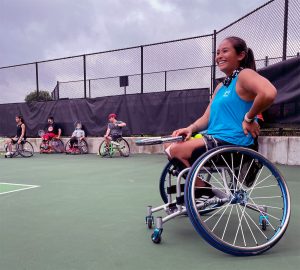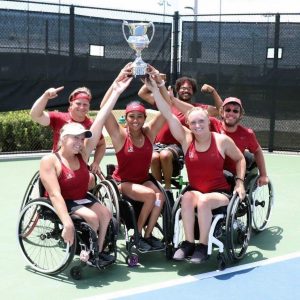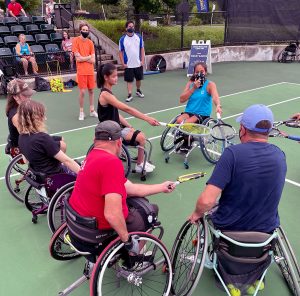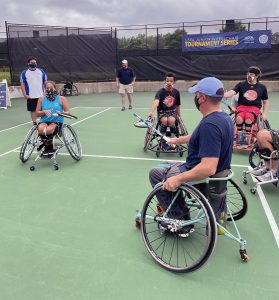Behind Shelby Baron’s contagious smile is a passion for her sport that she is passing on
“Let’s pick it up!” instructed Paralympian Shelby Baron, who was coaching at a recent camp and wheelchair tennis tournament for juniors hosted by the United States Tennis Association (USTA) Mid-Atlantic Region and the nonprofit Sportable in Richmond, Va.
“What are we?” Baron asked the athletes on the court, who were pushing from one corner to another prior to a practice session.
“Gladiators!” the campers shouted back.
Baron beamed.

Baron’s success as a Team USA player and as a collegiate champion for the University of Alabama precedes her, but as she waits on a wild card selection for this summer’s Tokyo Paralympic Games, she is staying busy setting others on her path as a USTA Net Generation regional tennis provider.
“I love sharing this incredible sport,” she said.
Baron credits the novel coronavirus (COVID-19) pandemic for giving her time off from her hectic travel schedule and more time to work on what and why she teaches.
“Being off the court really made me appreciate what tennis can do,” she said. “Not going full speed was enjoyable, and it was good for me to develop good habits.”
Baron didn’t go to an adaptive tennis camp until she was 15 years old, but she knows the power of having similar peers, especially for athletes.
“Being able to work through things by just playing a game instead of always focusing on competition is really important for keeping their passion alive,” she said.
For junior player Charlie Cooper, 13, becoming a top player in the world to complement his current top ranking in the United States is his goal. He and Baron represent the Per4Max wheelchair brand and are friends and mentors.
“I want to go to the Paralympics, too, so it is beneficial to hear about her experience,” Cooper said during the tournament in Richmond.
College Culture
Baron, 27, was born with spina bifida. She grew up in Hawaii and attended the University of Hawaii before transferring to the Crimson Tide program, where she earned a bachelor of arts degree in communicative disorders and master of science degree in speech-language pathology. She was also wheelchair tennis team captain, an Honor Society member and was involved with adaptive youth athletes in Alabama.

“I had to self-motivate when I was in Hawaii, but in Alabama, we all had the 6 a.m. practices and classes, and we were all tired physically, mentally and trying to fit in a social life. It was definitely a different culture for me, but it was easier to go through that grind with them,” Baron said.
Baron said her choice of studies stemmed from growing up in a hospital and doing a lot of physical therapy, but she realized being a therapist herself would be difficult.
“I love languages,” she said.
In college, Baron was persuaded to try a Per4Max product for the first time by her coach, Evan Enquist.
“When Shelby was playing for Alabama, she had a chair that was terrible,” said Per4Max founder and CEO William Hernandez. “She tried our product and good things happened, but more importantly, she became a face of what we can do for the tennis community.”
Since that time, Baron has represented the U.S. in seven World Team Cups (two as a junior and five as a women’s player) and at the 2016 Paralympics in Rio de Janeiro. Her current International Tennis Federation ranking is 34, and she is also working on her doubles game to become a more all-court player.
“In singles, they call me a counter puncher, because I rely on my speed and really like to chase things down and get them back, but I’m trying to become more aggressive at the net,” she said.
Baron still lives in Tuscaloosa, Ala., where she is a volunteer for Crimson Community Wheelchair Tennis, which earned her the 2018 Professional Tennis Registry Wheelchair Professional of the Year.

Chasing Dreams
Baron also brings a diverse personal background to the wheelchair tennis world, and her entire family is often in tow for tournaments and camps like the one in Richmond. Her mother, Rhoda, said their Asian American and Pacific Islander background has been a source of assumptions that she is a “helicopter mom” in the U.S., but internationally, it is not strange for parents or siblings to do elite sports together.
In fact, it was Shelby Baron’s older brother, Casey, who played competitive tennis first. Shelby Baron followed him into the sport and early on joined a Junior Team Tennis (JTT) team in Honolulu, which qualified for Nationals in 2012.
“I guess she was sick of sitting on the sidelines,” he said.
The apple also doesn’t fall far when it comes to participating in tennis off the court, either. The Barons received the USTA Hawaii Pacific Section Volunteer Family of the Year Award in 2016.
Rhoda Baron reflected on the Rio Games and many years of world traveling.
“I used to work for a travel agency, and so, I had all these brochures about places I wanted to go, and one day I was cleaning our loft space and I realized because of Shelby, I went to most of them,” Rhoda Baron said.
One year ago, though, Shelby Baron was told to go home in the middle of a tournament. The year that followed included less globetrotting and more work with a sport psychologist, plus weight training.
“I wasn’t trying for Rio. I was trying to get better,” she said. “Tokyo was a lot different, because I was trying to prepare myself, so that was stressful.”
But Baron isn’t wasting time worrying about it. She’s out there spreading the love of wheelchair tennis as far as she can.

“The key to being a great coach is to have high levels of engagement from your students,” said USTA Manager of Wheelchair Tennis Jason Allen said. “Part of what makes someone a great athlete is the willingness to give back, and Shelby understands that. She is going to be someone who will make an indelible mark on our sport.”
While some of Shelby Baron’s experiences include the time she had a full-body allergic reaction to fish while at a competition, a time a stranger assumed she’d needed help and pushed her in her wheelchair without warning and airline damages to three different chairs in less than a year, she wouldn’t change anything. Shelby Baron leaves every court with a smile.
“We think about outcomes and physical performance, but what goes into tennis is all my habits I do every single day,” she said. “I used to put a lot of pressure on myself … So, it is just about leaving the court happy.”
You can follow Baron’s journey on Instagram at: @barons808 and contact USTA about holding a Net Generation event at jason.allen@usta.com.